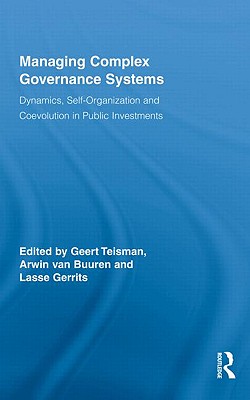Gathering some of the latest research in the field, the original essays collected here explain how non-linear dynamics, self-organisation of many agents and the co-evolution of processes combine to generate the evolution of governance processes, especially for public urban and metropolitan investments.
Advances in public management sciences have long indicated the empirical finding that the normal state of public management systems is complex and that its dynamics are non-linear. Complex systems are subject to system pressures, system shocks, chance events, path-dependency and self-organisation. Arguing that complexity is an ever-present characteristic of our developed societies and governance systems that should be accepted, understood and adopted into management strategies, the original essays collected in this book aim to increase our understanding of complex governance processes and to propose new strategies for how public managers can deal with complexity in order to achieve high-quality research.
The authors collected here use theoretical frameworks grounded in empirical research to analyze and explain how non-linear dynamics, self-organisation of many agents and the co-evolution of processes combine to generate the evolution of governance processes, especially for public urban and metropolitan investments. Managing Complex Governance Systems: Dynamics, Self-Organization and Coevolution in Public Investments offers readers an increased understanding of the main objective of public management in complexity--namely complex process system--and a strategy for accepting and dealing with complexity based on the idea of dual thinking and dual action strategies satisfying the desires of controlling processes and the need to adjust to changes simultaneously.
Get Managing Complex Governance Systems by at the best price and quality guranteed only at Werezi Africa largest book ecommerce store. The book was published by Taylor & Francis Ltd and it has pages. Enjoy Shopping Best Offers & Deals on books Online from Werezi - Receive at your doorstep - Fast Delivery - Secure mode of Payment
 Jacket, Women
Jacket, Women
 Woolend Jacket
Woolend Jacket
 Western denim
Western denim
 Mini Dresss
Mini Dresss
 Jacket, Women
Jacket, Women
 Woolend Jacket
Woolend Jacket
 Western denim
Western denim
 Mini Dresss
Mini Dresss
 Jacket, Women
Jacket, Women
 Woolend Jacket
Woolend Jacket
 Western denim
Western denim
 Mini Dresss
Mini Dresss
 Jacket, Women
Jacket, Women
 Woolend Jacket
Woolend Jacket
 Western denim
Western denim
 Mini Dresss
Mini Dresss
 Jacket, Women
Jacket, Women
 Woolend Jacket
Woolend Jacket
 Western denim
Western denim
 Mini Dresss
Mini Dresss






























































